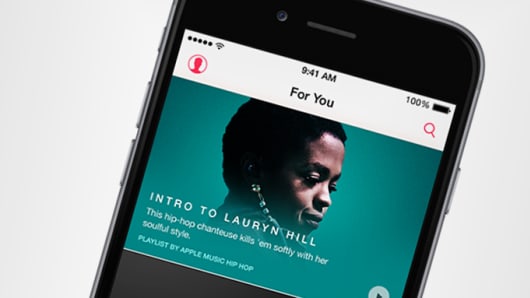Though Apple is coming from behind, I believe it will quickly dominate the marketplace and its smaller rivals will have to step up their games or get swept away.
Spotify has had an open playing field since it launched in 2011 but it will have a very hard time competing with a company that controls hardware, software and user data and has $160 billion in cash. Spotify now has 20 million paid subscribers and 55 million free users, so it may be able to play second fiddle. But, one day, Spotify will need to actually make money. Apple doesn't need to make money from selling music. That gives it a major advantage.
Read MoreNo need to be industry number one, says Spotify founder
Rhapsody will most likely become an acquisition target for another company that can use music to sell related products or it could be acquired to join a suite of services. Or it will fade away.
Tidal, which launched in late March, heightened awareness in the media, and sent the message that music streaming was here to stay. Rap star Jay Z purchased Swedish streaming company Aspiro and rebranded it as an artist-owned vehicle that would put power and money back in musicians' pockets. Tidal could create a business as a cultural platform and lifestyle destination encompassing sports, fashion and more. The company wins for hottest launch event, with major star power on hand, including Madonna and Jack White. One problem so far: Tidal hasn't hammered out deals with all the major labels, including Sony, so it doesn't have permission to stream catalog music from Jay Z's own wife, and co-owner, Beyoncé.
Read MoreApple Music and labels investigated by 2 states
To be sure, the most exciting elements of music streaming have not even begun. Music, technology and social connectivity go hand in hand. Over the past 10 years, thousands of highly creative individuals and companies have used technology to create everything and anything you could have dreamed of as a musician.
Yet, until now there had not been a viable platform for all of this technology. It is only a matter of time before Apple invites apps onto Apple Music and expands the music offerings to satisfy every relevant musical need. With music streaming comes social music, encompassing everything from collaborative musician sites like Blend.io that let musicians make music together online to Soundcloud whose network of users share mixes and tracks effortlessly or Sevenpop's virtual jukebox where retailers and restaurants allow shoppers to control the playlist.
Apple knows that music is great for selling everything except music. Apple does not need to sell music to make Apple Music successful. It only needs to keep users in its ecosystem so they buy more hardware, apps, and Apple owned products. Once again, Apple will step in and turn a struggling technology, this time streaming music, into the norm for consumers.
Commentary by Joshua Katz is CEO & Co-Founder of El Media Group, a custom music provider, serving the hospitality, retail and gaming industries. Follow him on Twitter @elrecords.


